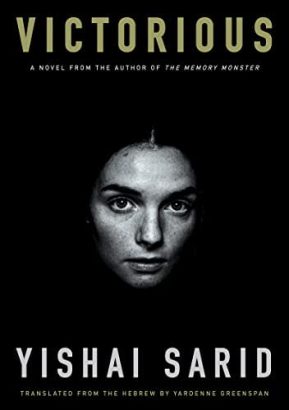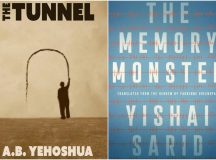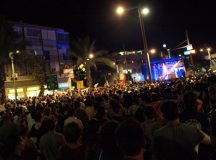‘Unlike others, I am no longer slaughtering sacred cows,’ Amos Oz told Niva Lanir in a 2012 interview pegged to the publication of Between Friends, his novel-in-stories set on a 1950s kibbutz. ‘There was a time when I did’, he reflected, adding in a later conversation with his editor Shira Hadad printed in What Makes an Apple? (2018) that ‘when I wrote Where the Jackals Howl, when I came out against Ben-Gurion during the Lavon Affair, I was full of the glee of killing sacred cows: the kibbutz ethos, the myth of the founding fathers, and so forth. But today when I see a whole swarm of slaughterers descending gleefully on one old cow, the kibbutz, I find myself on the cow’s side a little’.
Among contemporary Israeli writers, Yishai Sarid is one still in the business of slaughtering sacred cows. In The Memory Monster (2017) – whose English translation made it onto the New York Times’ list of 100 notable books in 2020 – the son of the former education minister and Meretz leader Yossi Sarid took on Holocaust remembrance, observing how the Shoah still has the capacity to consume and destroy a human being – in this case, a Holocaust researcher who also leads groups of Israeli schoolchildren around the extermination camps of Poland. The novel was not only a psychological examination of a man but also a nation, with Sarid exploring the ways in which Israel commemorates and memorialises the Holocaust have disfigured Israelis themselves.
With his latest novel Victorious (2020, published in English this year with a translation by Yardenne Greenspan), Sarid returns to the abattoir, turning his attention to another pillar of Israel identity: the military. Deploying similar narrative tricks including first-person narration and a story centred around one woman (in this case) as a means of looking at Israeli society more broadly, Sarid probes the consequences of militarisation for the Israeli psyche. Through the eyes of his charged, wild protagonist, he draws out the inherent tension between national security and the sanctity of the individual – between what is best for one versus what is best for all.
That protagonist, Abigail, is a single mother-of-one and a psychologist. Her specialism is the psychology of killing. She not only treats those permanently disturbed by their experiences of war, haunted by having killed another at close range, but in her role as a mental health officer attached to the IDF she teaches the psychology of warfare to new classes of battalion commander training officers – young, ambitious, authoritative men in their late twenties. Her interest and her role in the military is to turn fallible young recruits into soldiers capable of killing another human being more easily – not for their benefit per se, but the benefit of the military as an institution.
Her practice brings her into conflict with her father, a psychoanalyst in the Freudian sense who regards newer forms of psychology and psychotherapy as little more than glorified life coaching and hand-holding. But their dispute is more than methodological. ‘But what is the end goal? Why does the paratrooper brigade need a psychologist?’ he probes his daughter. ‘To beat the enemy,’ she replies, to which he responds, ‘There, you’ve said it yourself. What’s that got to do with psychology?’:
When I told my father, at age seventeen, that I’d applied to psychology studies as part of my military service, he tried to talk me out of it. ‘It’s a dangerous combination of psychology and army,’ he said. To this day, I can hear his measured tone. ‘It’s the greatest contradiction imaginable. The military is a totalitarian cohesion that erases the individual, and in our profession the individual is all that exists, and your loyalty toward them must be absolute. What are you hoping to achieve?’
Victorious is a novel of divided loyalties. Abigail’s commitment to her craft, to the psychology of killing and shaping a generation of soldiers capable of killing without consequence, causes her to push young recruits past the point of breaking. ‘One of the high points of my military service had been reimagining captivity training for elite units,’ she says proudly, and Sarid harrowingly describes the disturbing orchestrated destruction of Noga, a young female air force recruit left sitting in a pool of her own urine after one such training exercise. ‘Why did you go this to me?’ she asks Abigail. ‘Did you come here to ruin my life?’ Another patient, Nivi, beseechs Abigail:
I remember your office on base. It was nice, not like the other military offices. There was a soft chair and you invited me to take a seat. For a second, I felt like a human being, not military property. And you spoke kindly to me, you smelled good. I felt like you were my older sister. I looked up to you. I remember that day you came to see us on the field, how cool you were. You said you’d discuss my case with the commanders and make sure they’d keep an eye on me, that you understood how hard it was for me. You promised me, but then you didn’t do anything about it. Nothing. You killed me.
Abigail is also torn between her professional obligations and personal desire. Whether with Jonah, a young sniper on the southern border, or Rosolio, the IDF chief of staff for whom she serves as a kind of psychological muse, Abigail frequently oversteps the boundary no psychologist should ever cross. With Rosolio, she had a son, the product of one night of passion. Shauli’s father’s identity is hidden from him. When he reaches adulthood, instead of taking the easy route to the intelligence corps, Shauli opts to enlist in the paratroopers, much to Abigail’s obvious distress, and here her belief in her work butts up against her motherly instincts.
The Memory Monster was a masterpiece, and by definition not every novel can meet that standard. Sarid is guilty of telling his ideas in the form of dialogue in situations when he could be showing, while Greenspan’s generally crisp translation suffers from one or two clumsy sentences. ‘It’s a dangerous combination of psychology and army’ is one aforementioned example; ‘Dad was tender and sensitive with him, offering him all the love he’d deprived me of’ would be another. Still, Victorious is an admirable novel, lean, mean, and often gripping, and Sarid is to be commended for once again showing no mercy, knife in hand, when faced with perhaps his country’s most sacred cow of all.




































